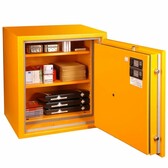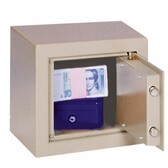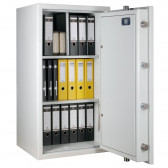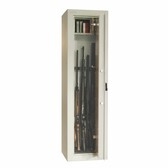Home safes have been growing in popularity for years. The reasons for this can be traced to many aspects of modern reality, from the waning trust in banks as a place to store money, through increasing inflation and the conversion of cash into securities or precious metals, to the growing awareness of risks and the responsibility of customers, for which we work with great perseverance. Be that as it may, the concept of a home safe still raises quite a few questions and there is a catalogue of questions that you ask us most often. Let's take a look at them and try to answer them quickly.
What is a home safe?
Let's start with the basics – a home safe, what is it? In the shortest terms, a home safe can be any safe that you put up in your house and use for personal purposes. Personal does not automatically mean private. Many of our customers are sole traders and have a home safe precisely for the secure deposit of company documents.
There are different types of home safes, depending on your requirements. So there are free-standing, fireproof or wall safes, there are compact safes that you can install in furniture, and there are larger devices for which you have to organise space.
What can be stored in a home safe?
A home safe is the most versatile category of safe, where you can keep almost anything at your discretion. The larger the model you choose, the more items or documents you can secure. At the same time, remember that the security class of the safe should increase with the value of the items deposited. In particular, therefore, you can store the following in the safe
• money,
• valuables,
• important documents,
• jewellery,
• data carriers,
• securities,
• weapons,
• watches,
• collector's items,
• works of art.
Safe for small arms or long weapons
The question about the requirements for storing weapons arises extremely frequently, so we take this opportunity to explain. According to the Weapons and Ammunition Act, firearms should be stored in a safe which meets the requirements of at least Class S1 according to EN 14450, i.e. the lowest class available on the market. This means that, in principle, any safe certified to European standards can hold a firearm, but also that an S1 class home safe is not suitable for anything else. S1 class safes are single-wall, lightweight and, let's face it, easy to break into, with the only advantage being the lowest price of all available classes.
Where to install a home safe?
The nice thing about home-mounted safes is that you can install them almost anywhere that suits you. Remember, however, that a home safe, in order to be mounted according to the art and secure, must be permanently attached to a structural element of the building –either the floor or the wall. And preferably both.
Popular locations for a safe are the wardrobe or bedroom, rooms that are by definition quite intimate, where only household members have access. If you run a business and the safe is to keep business documents secured, its place will be in the home office. In contrast, larger home safes, whose weight and dimensions would be cumbersome in a house, can be placed in the garage or other utility room.
As a general rule, when given a choice between free-standing and wall-mounted home safes, the free-standing safes will be better. It may seem that a wall-mounted safe presents a greater challenge to a burglar, but this is not true. The categories of wall safes are few, there is no chance of fire resistance and the safes themselves are only secured from the front. Instead of embedding the safe into the wall, it is therefore better to choose a well-made free-standing safe with similar dimensions. Wall safes are cheaper and take up less space, but this is precisely the case where the lowest price does not always make sense.
How do you choose the best safe for home?
There are several criteria for choosing the best home safe, but there is also one for how to choose the worst one – the lowest price. Home safes vary, but if you have the safety of your valuables at heart, it's worth investing in a safe that will realistically protect the items hidden in it from theft.
The securest safes are therefore those with a high burglary protection class, at least class I according to EN 1143-1. Such products are characterised by a considerable weight, which increases with the size of the safe: the larger the size, the heavier the safe. Additional security is provided by the included anchors, with which the safe is permanently fixed to the floor or wall.
For domestic use, it is worth considering a fireproof model, as a fire in a private setting poses a more serious risk than in an office.
Which lock to choose for a home safe?
From a security point of view, the type of lock does not really matter. You will find a key lock, a mechanical combination lock, an electronic lock and a biometric lock in the range. Each of these products has its own advantages and disadvantages:
• the key lock is the cheapest, but the keys need to be guarded,
• a combination lock (mechanical) is stylish and maintenance-free, but requires concentration,
• electronic lock is the easiest to use and has few disadvantages, just remember to change the battery once every 2-3 years,
• a biometric lock is the most modern solution, but requires a constant power supply and is quite expensive.
You may be interested in: How to open a safe? Ways of opening different locks.
Summary
Ultimately, you decide what to buy and which products meet your expectations. Home safes are a broad concept and, not surprisingly, there are quite a few questions about them. To make the best decision, you need to confront several factors, so contact us. Any questions will be answered, any doubts will be dispelled quickly, professionally and without hesitation.
You can also read about home safes in our other articles: Fireproof safes at home





